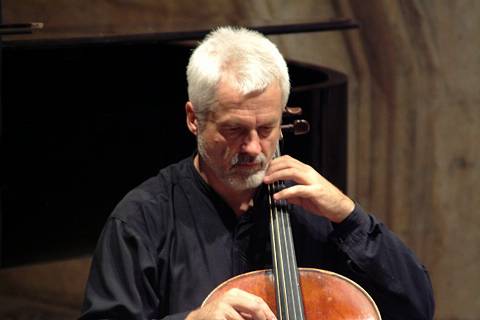|
<< -- 2 -- Tess Crebbin SPECIAL SIGNIFICANCE

Among the performers, opinions are divided as to whether their country's inclusion in the European Community will mean a significant change in its musical landscape. Lithuanian conductor Donatas Katkus is one of those who feel that it will. 'Many musicians from other European countries will now be attracted to Lithuania,' he says. 'This process has started some ten years ago but will intensify now that we are part of the European Community. On the other hand, many more of our own musicians will go study in places like Germany and France. We now feel that we are part of a much broader cultural tradition whereas we were always restricted to Russian lands before. Of course, our violin school will continue to retain its importance. But especially for old music you need a different kind of musical understanding, such as is being taught in France, Holland or Germany.'

Donatas Katkus (far right), hosting visitors from the UK (pianist Tamami Honma and composer John McCabe) in Rotuse Hall, Vilnius, Lithuania. In the background, members of the St Christopher Chamber Orchestra of Vilnius. Photo © 2003 Adrien Cotta
|
Krzysztof Penderecki, on the other hand, feels that not much will change, musically, with his country's joining of the European Community. 'As far as film, theatre and music goes, Poland already holds a very important position in the European cultural scene. The new European Community standard will not change anything as far as that is concerned.'
Slovenia's Milos Mlejnik holds a similar view. 'Our current Philharmonic Orchestra was founded in the eighteenth century. Haydn was an honorary member and Beethoven has sent us a copy of his sixth symphony. Culturally, we were always part of the Austrian monarchy and so not a lot is going to change for us.'

Milos Mlejnik plays Tartini
|
Hungary, on the other hand, may very well benefit from the new European landscape, according to conductor Domonkos Heja. 'If I want to hear a top international orchestra, I still have to travel to a place like Vienna. Great guest conductors like Abbado or Dohnanyi are an exception in Hungary. Unlike Vienna or Berlin, we only have concerts of such magnitude maybe once or twice a year. The same goes for opera. Of course we also have very good performances, but not nearly of the same level as, let's say, Vienna. I am sure that our membership of the European Community will now make it easier to invite international top conductors to our country.'
Continue >>
Copyright © 5 May 2004
Tess Crebbin, Germany

|

